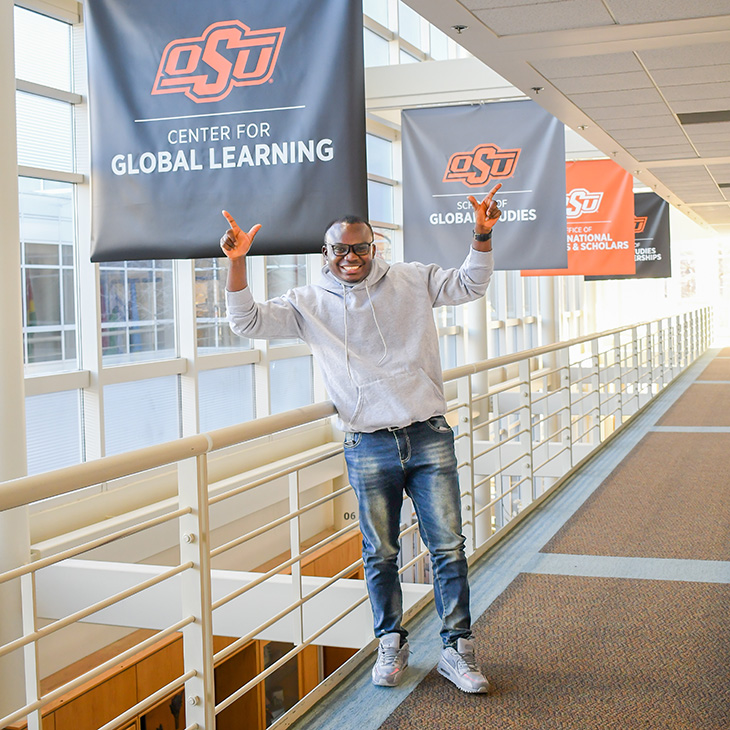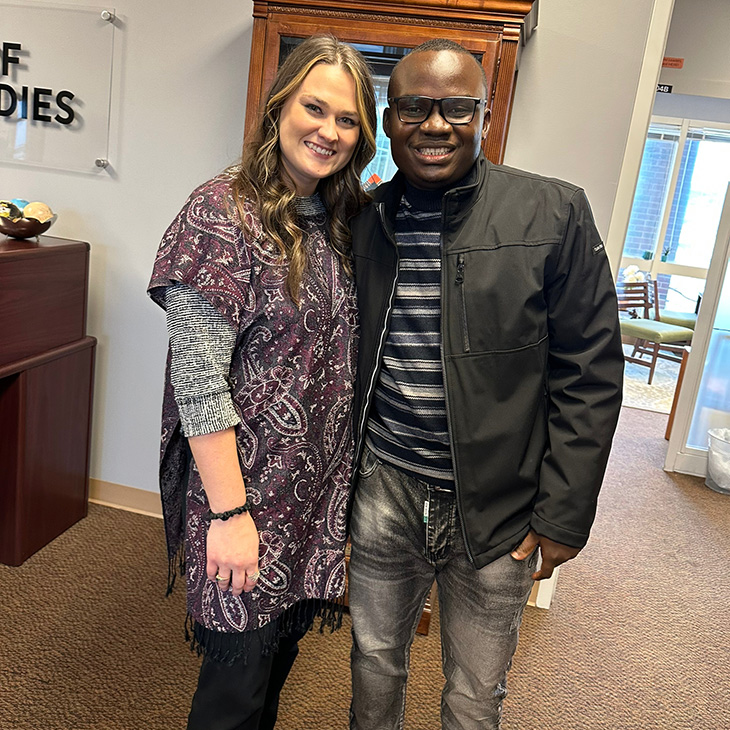
Cowboy Clinton: International student takes unique path to OSU
Thursday, April 27, 2023
Media Contact: Mack Burke | Associate Director of Media Relations | 405-744-5540 | editor@okstate.edu
Cowboys in America are revered; a symbol of both the Old West and ruggedness on the frontier. Across the Atlantic Ocean, though, in the small African country of Ghana, the word has a different meaning.
In a culture where family means sticking together, working alongside each other at the farm, the idea of up and leaving to go on the path of a cowboy is reviled.
So, when Clinton Wuanka was called Cowboy Clinton in school growing up, it was an insult. But Wuanka embraced it. To him, it was a badge of honor that he wore proudly.
UNEXPECTED VISITORS
It all started with an orange T-shirt.
On a Saturday afternoon in 2000, Wuanka — 6 years old at the time — received the garment emblazoned “Oklahoma State University” from a Peace Corps volunteer and OSU student named Anaya.
“I don’t forget her name,” Wuanka said. “I always tell myself I’ll give the name to my daughter because her name is really precious to me.”

How that shirt arrived in the small town of Dzolo Gbogame in the southeastern part of Ghana called the Volta Region starts with the story of Wuanka’s grandfather: Denqueh.
Denqueh Wuanka was a former staff member of Operation Crossroads Africa. Founded in 1958 by Dr. James H. Robinson, Operation Crossroads Africa was designed to facilitate service projects in African countries each summer. It was a predecessor to the Peace Corps in that region.
For almost 30 years, Denqueh served as a director of the program where he coordinated the projects of volunteers, usually students, who offered to construct buildings and provide education. During this time, he earned the nickname of NOWAY because of his firm stance on raising his grandchildren through education.
In 1972, Robinson died and Operation Crossroads Africa dwindled, sending Denqueh back to his hometown of Dzolo Gbogame where he farmed with his grandchildren.
Traditionally, a child born into a farming family in Ghana is old enough to work at 2 years old. Although the children had jobs on the farm, they would still attend school. Oftentimes, they woke up early to go work at the farm before school, wearing their school clothes under their work clothes. After class, they went back to the farm for more work before going home at night.
When Wuanka was growing up, the custom warranted when men reached the age of 20, they married a woman from the area, had children and the cycle continued.
This would have been Wuanka’s life if it weren’t for his grandfather.
The day Wuanka got the shirt from Anaya, he and his family were cultivating their cocoa system when his grandfather received a message that they had visitors back at the house.
“We were so traditional to the extent that when they said you have a visitor, you need to give serious priority to the visitor, because you may not know the message they came with, so we rushed home,” Wuanka said.
Two hours later, they arrived home to find 10 individuals waiting to greet his grandfather. They had met him through the Peace Corps and came to volunteer in the area.
From that day on, Wuanka developed a passion for OSU.
“I would always tell everyone around me that one day, I would go to Oklahoma State University,” Wuanka said. “I went around everywhere including the farm, school, market and riverside saying I would one day go to Oklahoma.”
FINDING HIS WAY
Receiving an education past junior high school was not popular in Wuanka’s hometown at the time as it was felt someone’s time could be better spent on farming.
Wuanka’s friends mocked him for his college dreams, people in the community told him he was going crazy and his parents told him it was impossible. In Dzolo Gbogame, the highest level of education usually received is junior high school.
Denqueh composed a library of his journals, diaries and letters from Operation Crossroads Africa and used them to teach Wuanka to read and write English.
Wuanka learned from Anaya that people at OSU were called Cowboys and Cowgirls. Therefore, Wuanka wanted to be known as Cowboy.
Wuanka was one of five students in his class of 47 who received admission to senior high school. At a new school with new people, he introduced himself as Cowboy Clinton Wuanka and again he was mocked.
“I knew Cowboy came from being a student of a prestigious university located somewhere I’ve never been before, but I had hope — one day, I would be there,” he said.
He completed high school in 2013, stayed home and worked for the next three years. In 2016, the same year his grandfather passed away, Wuanka decided to attend the University of Cape Coast (UCC) in Ghana to obtain his bachelor’s degree, which he would then use to transfer to OSU.
When he told his parents his plans to attend UCC, they disapproved. They informed him they wanted him to be a teacher and earn a diploma in basic education from a nearby school. He agreed to go to avoid backlash, but ran away at night to Accra, the capital city, without anywhere to stay.
“I slept at some car transport terminals when they closed from work,” Wuanka said. “I just asked permission from the drivers and said I don’t have a place to go.”
He slept in the back of the cars, then got up and showered in the station washrooms.
For the next six months, Wuanka worked as a driver’s assistant and in construction to get enough money to apply to UCC. He eventually graduated in 2020. He then served his year of mandatory national service in the Parliament of Ghana.
With his new job came access to a good phone, a laptop and a paycheck. He said to himself, “Now it’s time for the Oklahoma dream to begin.” He began looking for sectors of Ghana lagging behind that he could use education to improve. He landed on trade policies.
“I typed ‘international trade at Oklahoma State University’ on the laptop but … I made up my mind that even if Oklahoma State did not have anything about trade, I would not let go of it because I was not ready to trade Oklahoma State for any program,” Wuanka said.
The first result was OSU’s School of Global Studies. Amazed by the variety of programs available, Wuanka reached out to then academic programs coordinator Cara Menasco Eubanks.
Eventually, in his inbox was an email from Eubanks notifying him of a nonresident tuition reduction award, which can be used in situations like Wuanka’s.
“Waiving that portion of the tuition for international students helps a lot and it helps them get a visa,” Eubanks said. “International students have to show proof that they have the finances to cover their education expenses for at least a year before they even get here. When we can do anything to reduce the cost of attending OSU, it drastically helps them.”
Eagerly waiting for his admission letter, Wuanka said he called OSU’s Graduate College sometimes 10 times a day. Eventually, the day came — he was granted admission.
Holding his grandfather’s picture, he said “my dream is coming true, watch out.”

TRAVEL TROUBLES
Visa appointments in Ghana were unavailable until 2024, prompting Wuanka to travel to the embassy in the nearby nation of Burkina Faso.
However, the embassy was prioritizing its own citizens and placed him in an administrative process to review his documents where he stayed for six weeks.
“I nearly died at that time because a dream that had been lingering for over 20 years was about to be fulfilled. What stood between me and Oklahoma State was a consular officer who didn’t want to issue my visa,” Wuanka said.
Wuanka began advocating for himself and worked with Eubanks — also known as “mom” to him and other international students — to contact the embassy to approve his visa.
“Clinton is very persistent, which is needed. It’s difficult to get a student visa to the United States. You need that persistence and Clinton certainly has it,” Eubanks said. “ I don’t know if his persistence is just his personality or his background and his story, but it’s just so clear how much passion he has for OSU.”
Hoping to move his case along, he went as far as working with Eubanks and Dr. Jami Fullerton, associate dean of the School of Global Studies, as well as U.S. Sen. James Lankford and faculty at OSU Global to send inquiries on his behalf to the embassy in Burkina Faso.
In order to begin his studies at OSU, the last day Wuanka could report to campus was Aug. 29 or he would have to defer to the next semester. Using his network, he contacted leaders in the Ghana parliament who tried to contact the consular section of the embassy on his behalf.
“We are so fortunate to have Clinton studying in our program. Not only does he bring a fresh perspective to our classes from his life in Ghana, his lifelong desire to study at OSU reminds us and our students as to the immense privilege of working, and studying, at OSU.”
Wuanka finally got an interview appointment for Aug. 25. Unfortunately, he was again put into an administrative process for verification of his documents and enrollment, causing him to defer his program.
While waiting, the team at OSU Global kept in contact with Wuanka and helped him emotionally get through the hard times. On Sept. 1, his visa was approved.
His goal was to be in Oklahoma before 2022 ended. On Dec. 29, Wuanka left Ghana to chase his Cowboy dream.
“We are so fortunate to have Clinton studying in our program,” said Dr. Randy Kluver, associate provost and dean of OSU Global. “Not only does he bring a fresh perspective to our classes from his life in Ghana, his lifelong desire to study at OSU reminds us and our students as to the immense privilege of working, and studying, at OSU.”
Now a first-year graduate student at OSU, Wuanka plans to get a master’s and doctoral degrees while working in the Center for Global Learning and then return to Ghana.
“When I look at where I’m coming from — a village where mostly we are predominantly made of families — nothing was working when it came to education, and I’ve been able to get this far,” Wuanka said. “Sometimes when I lay on my bed I say ‘God, you really exist.’
“I thank God a lot for that kind of grace.”
Photos By: Gary Lawson, Andrea Sisson and Provided
Story By: Sydney Trainor | STATE Magazine
